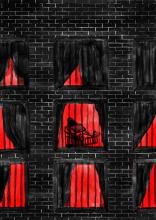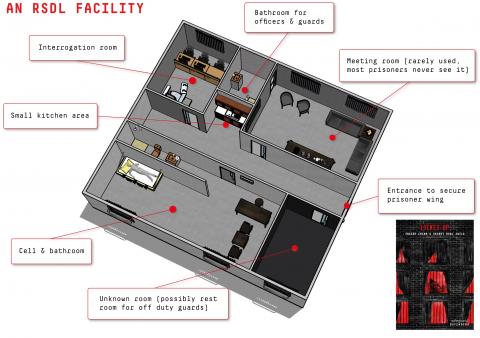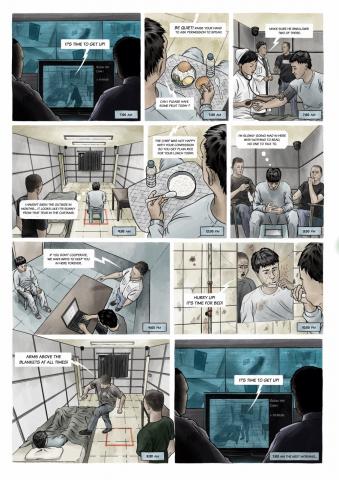Deaths in China’s RSDL system spark domestic calls for reform
China’s feared Residential Surveillance at a Designated Location (RSDL) system, a form of detention where the detainee is kept in isolation at a secret location for six months before formal arrest, has long come under heavy international criticism.
But in recent months, there have also been growing calls from inside China from legal experts, defence lawyers and in the media to reform or scrap the system following a string of deaths in RSDL.
UN human rights bodies have called out RSDL for being “tantamount to enforced disappearance” and posing “a high risk of torture or ill treatment” to detainees. Safeguard Defenders has conducted extensive research into RSDL, focusing on human rights defender detainees, who are often disproportionately targeted. See the end of this article for links to our RSDL publications.
These mounting calls inside China for RSDL reform come ahead of planned revisions to the country’s Criminal Procedure Law (CPL), which regulates RSDL.
Media have reported that the current 14th National People’s Congress Standing Committee is expected to discuss amendments to the CPL before its five-year terms ends in 2028.
In May this year, the story of the death in RSDL of a Beijing-based tech company manager, Xing Yanjun, went viral in China. Police arrested Xing in Inner Mongolia on illegal gambling charges last November and placed him into RSDL after prosecutors denied their application for arrest. Four months later, Xing’s family was told he had hung himself in his cell.
This is suspicious particularly because prisoners in RSDL are under 24-hour surveillance; guards even accompany detainees into the bathroom. RSDL cells are also sometimes suicide proofed.
Xing is not the only one. Three others RSDL deaths in the past couple of years have also hit the headlines, all results of likely mistreatment or torture.
- Bao Qinrui, died in 2022 in RSDL. His body bore marks of electric shocks and beatings.
- Yuan Shihong, a 51-year-old electrician, died from a pulmonary embolism on the 10th day of his confinement in 2023. And,
- Xia Juntao (pseudonym), who developed a severe brain disorder in RSDL linked to a lack of vitamin B1, died in 2019. In his case, the police officer in charge was sentenced to three and a half years for intentional injury.
The main criticisms inside China are centered on how police have overused and misused RSDL, a system which has no judicial oversight. This gives police free rein to torture prisoners, coerce confessions and prevent lawyer access, they argue.
RSDL was originally meant as a softer form of detention, a way to prevent filling up detention centres with suspects whose alleged crimes are not that serious and who are not candidates for house arrest because they do not live in the jurisdiction where the investigation is located. In 2012, the law was amended to allow police to use RSDL in cases involving national security (typically human rights defenders), terrorism and major bribery. It’s use under Xi Jinping has rapidly expanded and there is good evidence that it constitutes a crime against humanity.
Zhao Li, a partner at a Beijing-based law firm called for an end to RSDL in Jiemian News in August, saying that it was a system that allowed torture, illegal evidence collection and prolonged interrogations and interrogations under sleep deprivation.
"There is no way to improve it. As long as this system exists, it will keep being misused,” said Zhao.
In July, Chinese newspaper Southern Weekend, covered the deaths in RSDL and quoted police saying they choose to use RSDL because they have longer to interrogate a suspect before they need to apply for permission to arrest. RSDL can be imposed for six months before arrest, compared with the 37 days in a detention centre. They added that unlike in detention centre, RSDL frees them to interrogate a suspect any time of the day or night.
That same month, legal experts discussing recommendations for CPL revisions at the National Criminal Justice System Forum held in Yantai, a city in eastern Shandong province, concluded that RSDL should be scrapped.
At that forum, Chen Weidong, Executive Vice President of the Chinese Criminal Procedure Law Society and a professor at Renmin University, argued that RSDL was redundant. The majority of crimes committed in China, he said, were minor so that suspects could simply be released on bail. There was no need to send them to RSDL.
The forum’s draft recommendations called for RSDL’s removal from the CPL as well as increasing the rights of defendants, including the right for lawyers to be present during interrogations, with law enforcement required to notify lawyers 48 hours in advance
According to Hong Kong newspaper South China Morning Post (SCMP) an online discussion held in June by the Hongfan Institute of Legal and Economic Studies, a Beijing-based think tank, argued that RSDL was not being used the way it was intended to be used.
Chen Yongsheng, who was part of the online discussion said RSDL was “unconstitutional, could lead to false convictions, and was a serious violation of human rights”.
Beijing-based lawyer Zhou Ze told the SCMP that the conditions of RSDL made torture more likely because there was no legal requirement to record interrogations (interrogations in detention centres must be filmed) and that the location was secret and outside supervision.
The SCMP also quoted Si Weijiang, a human rights lawyer, that the use of RSDL should be restricted to cases concerning suspected terrorism.
In March 2024, Bian Jianlin, a professor at China University of Political Science and Law, writing in the Shanghai Legal Daily, here reproduced in The Paper, argued that RSDL should be scrapped because of the lack of judicial oversight and basic rights for detainees.
“Because of flaws in its design and execution, RSDL should be abolished in future amendments to the Criminal Procedure Law," argued Bian.
In November last year, Zuo Jianwei, a law professor at Beijing Normal University, criticized RSDL in The Paper based on its denial of lawyer access and the likelihood of torture.
And, in October last year, Zhang Jianwei, a professor at Tsinghua University’s Law School and vice president of the China Criminal Procedure Law Research Association, published an article in Southern Weekend arguing that RSDL is being used to coerce confessions.
This is not the first time that a death in custody has caused public outrage in China and calls for it to be abolished.
Back in 2003, police beat a young migrant worker, Sun Zhigang, to death in southern Guangdong province while he was being held in under an administrative type of detention called Custody and Repatriation. This system enabled police to temporarily hold anyone who did not have the correct paperwork to show they had the right to live and work in that area. The night the police picked up Sun, who was from Hubei province, he had forgotten to carry his ID card.
The outcry over his death led the government to scrap the system, just months after Sun’s death.
Bao Qinrui (暴钦瑞),
Reason for being placed in RSDL: Accused of picking quarrels and provoking trouble (a charge commonly given to petitioners)
When did he die: 20 July 2022, just 13 days into RSDL
Official reason for death: Pulmonary embolism from being placed into stress positions for long periods of time, beatings, and electric shocks
Police grabbed Bao, who was only 34 years old, his father, and seven other relatives from their homes in Shijiazhuang (a city in Hebei province) on suspicion of various activities, including assaulting migrant workers, loan sharking, and illegal detention on 7 July. However, police from Xinle, another city in Hebei, took over the case, giving them the excuse to use RSDL rather than home arrest.
A few days after Bao died, police released his father and other relatives from RSDL, and told the father that his son had died. All of them told Chinese media that they had been beaten and shocked with electric batons in RSDL.
Xing Yanjun (刑燕军)
Reason for being placed in RSDL: Suspected of operating an illegal gambling business
When did he die: 3 April 2024
Official reason for death: Suicide by hanging
Probable reason for death: The Family has asked police and prosecutors to investigate as they do not believe it was a suicide. To date, there has been no response.
Police grabbed Xing, the general manager of Youyou Interactive (Beijing) Technology Co., Ltd., and 13 other employees on 8 November 2023.
According to the family, in December, the prosecutors denied the police request to have them arrested, so they placed Xing and 11 of the employees into RSDL in Hulunbuir in the Inner Mongolia region in China.
Yuan Shihong (袁时宏)
Reason for being placed in RSDL: Suspected of stealing
When did he die: 18 September 2023
Official reason for death: Pulmonary embolism
Probable reason for death: Extended stress positions in RSDL exacerbating health conditions
Police detained Yuan, a 51-year-old electrician from Jingmen in Hubei province on 7 September 2023 along with a former colleague. His RSDL took place in a local hotel, Tianhao Hotel.
Yuan was rushed to hospital on the 10th day of his RSDL when he was found unconscious. In the hospital, he died after having a heart attack and suffering respiratory arrest.
His death was investigated by the Jingmen People’s Procuratorate, which found serious issues with how the two men had been treated in RSDL. In October 2023 the family made a RMB1.8 million settlement with the police. Only one officer, Dai Mengfan, who headed the investigation team, faced criminal charges.
Xia Juntao (夏俊涛) (not his real name)
Reason for being placed in RSDL: Not known
When did he die: Sometime in 2019
Official reason for death: Wernicke's encephalopathy caused by severe malnutrition
Xia (a pseudonym) spent several months in RSDL in 2019 in Jingjiang in the eastern province of Jiangsu. Xia was subjected to intense food and sleep deprivation – just half a bowl of thin soup per meal and broken sleep of two to three hours a day. He lost 30kg in four months of RSDL. Because of his mistreatment in RSDL, Xia developed Wernicke's encephalopathy, a severe brain disorder resulting from thiamine (vitamin B1) deficiency.
Xia’s death was investigated, and Chou, a police officer who oversaw the case, was held criminally responsible. He was convicted of intentional injury and sentenced to three and a half years in prison and was released in February this year.

We use graphics and interviews to take the reader into the reality of being held in RSDL in our report Locked Up: Inside China’s Secret RSDL Jails.

